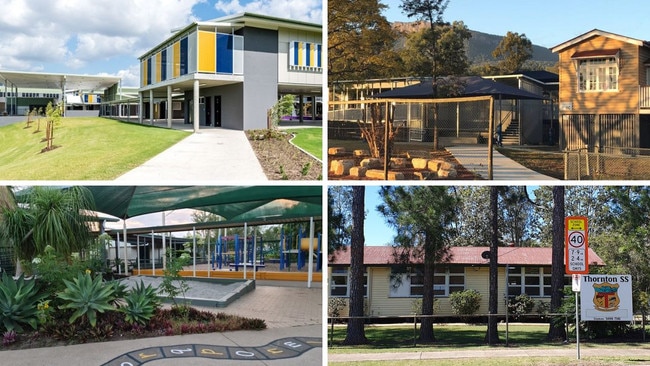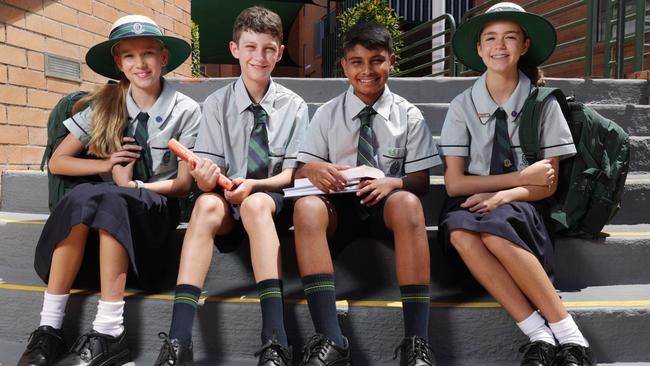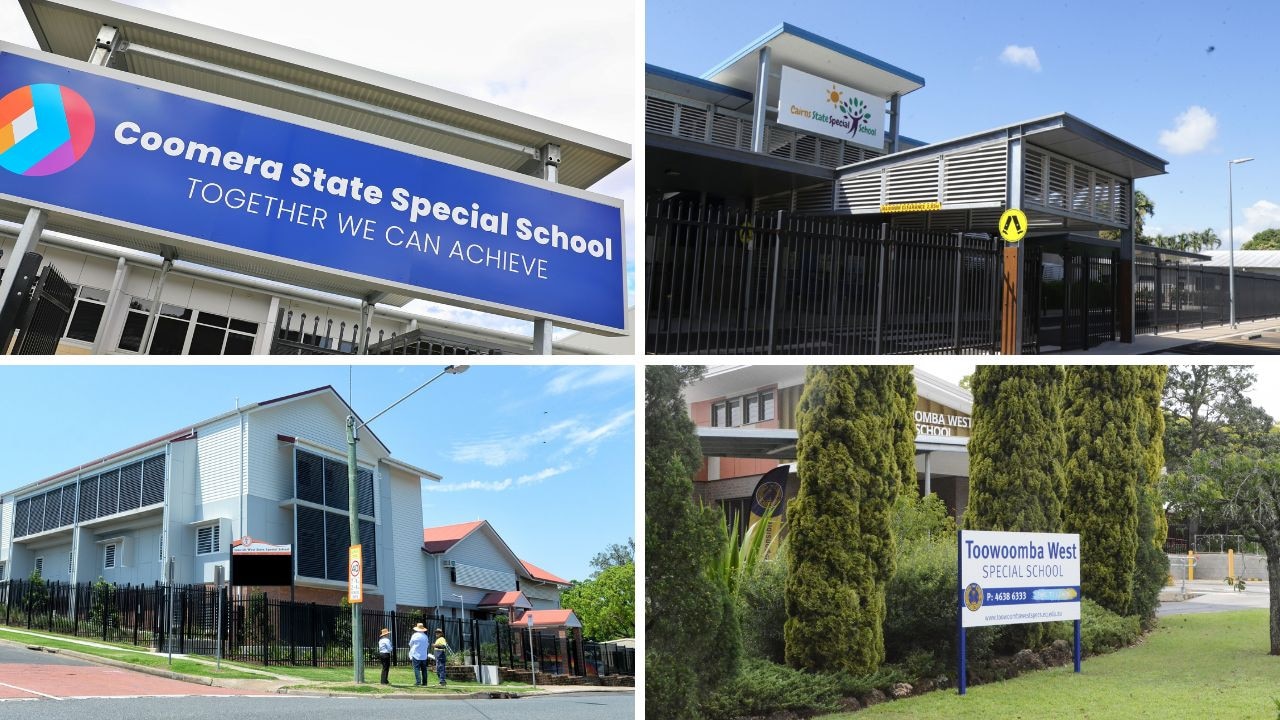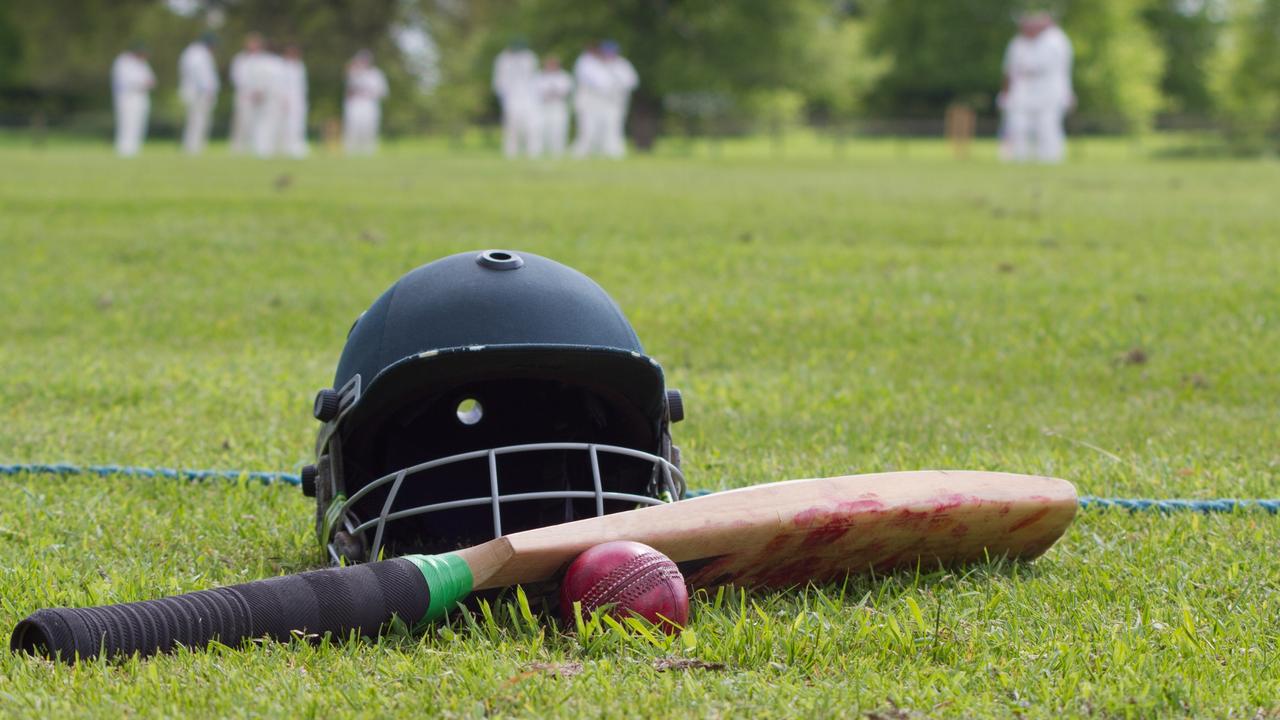Ranked: Qld’s fastest growing – and rapidly shrinking – schools
Queensland’s fastest-growing schools have at least tripled their enrolment numbers in the past five years, while some schools have gone backwards by more than 65 per cent. SEARCH FOR YOUR SCHOOL

Schools Hub
Don't miss out on the headlines from Schools Hub. Followed categories will be added to My News.
Queensland’s 10 fastest-growing schools have at least tripled their enrolments in five years, with soaring schools largely linked to housing booms or having opened relatively recently.
In an exclusive analysis, The Courier-Mail sourced enrolment numbers for all schools in 2018 and 2022 and compared the five-year change.
The two fastest-growing schools were micro schools – Ipswich’s Maroon State School topped with 267 per cent growth, while the Granite Belt’s Pozieres State School had a 263 per cent jump.
Picnic Creek State School on the Gold Coast was third, going from 268 to 894 enrolments, and Bellbird Park State Secondary College in Ipswich grew from 520 to 1664 students.
There was also an incredible jump in enrolments through the state-run Capricornia School of Distance Education in Rockhampton, soaring from 1660 students to 5259. This aligns with the widespread spike in home and distance education following the pandemic.
Another notable surge was seen at St Benedict’s Catholic School in Townsville, hitting 480 enrolments in 2022, up from 167 when it opened in 2018.
Townsville Catholic Education executive director Jacqui Francis said the city’s rapid growth, coupled with an increasing preference for Catholic education, was the catalyst.
“The strong population growth within Townsville’s northern and western suburbs including Shaw, Bohle, Mount Louisa, Burdell, Mount Low and Kirwan, has seen St Benedict’s grow from strength to strength,” she said.
Following St Benedict’s success, it was announced last month that a new co-ed Catholic secondary school will open in Townsville in 2025 – Mary Help of Christians Catholic College.
The other schools achieving an enrolment increase of at least 200 per cent included McAuley College in Beaudesert and Baringa State Primary School on the Sunshine Coast.
Then there is independent Christian school Carmichael College in Morayfield in Moreton Bay, which has grown by 167 per cent in five years – leaping to 595 enrolments in 2022.
Principal Richard Davies said this year they had over 700 students, and expected around 850 next year. It is currently a Prep-Year 10 school, with Year 11 and 12 to be added soon.

He said the school was sandwiched between two big new housing developments – Kinma Valley in Morayfield and Narangba Heights.
The college’s master plan had set a maximum of 1300-1400 students by 2030, but with the area’s growth, the school could hit that limit one or two years early.
“We have a huge swath of the community coming to us looking for those Christian values to be instilled in their young people, which is interesting given only 20 per cent of our families actually come from Christian backgrounds,” Mr Davies said.
At the other end of the scale, regional micro state schools made up the majority of those with the greatest decline in enrolments over the same five-year period.
Goodwood State School in Bundaberg had the sharpest drop with a 78 per cent fall, followed by Macknade State School in North Queensland and Orion State School in Rockhampton.
Ipswich’s Thornton State School, Numinbah Valley State School on the Gold Coast, Mistake Creek State School in Central Queensland, and Birdsville State School in South West Queensland all saw enrolment declines of 55-70 per cent.
The exceptions to the regional micro school trend were Seton College in Brisbane’s South, which dropped from 320 students in 2018 to 116 in 2022, as well as St Teresa’s College in Abergowrie in North Queensland, which slumped from 190 to 77 enrolments.
Townsville Catholic Education said a post-pandemic review resulted in the decision to deliberately reduce numbers at St Teresa’s.
“This change has enabled many opportunities for the students through allowing for a greater focus on personalised learning requirement of each student and assisting in providing opportunities and pathways to achieve their career, goals and aspirations for the future.”
Other notable enrolment drops were seen at Mater Dei Catholic Primary School and St Peter Chanel Primary School on Brisbane’s northside, with both shrinking by over 30 per cent.
There was a 49 per cent decline at Gympie Central State School, and over 30 per cent drop at the Fraser Coast’s Aldridge State High School and the Gold Coast’s Coomera State School.
Meanwhile, one of Brisbane’s top private schools, Clayfield College, suffered a 29 per cent decline in enrolments from 2018-2022, slipping from 565 to 400.

A college spokeswoman said the school recognised enrolments had dropped, which prompted them to announce in late 2021 that the girls’ school would transition to co-ed as of 2023.
“For two consecutive years (2022 and 2023), the College has seen a 400 per cent increase in the number of enrolment applications it was receiving prior to the announcement to transition to fully coeducational. Throughout 2023, College tours were oversubscribed,” she said.
“Term 1 enrolments for Pre-Prep to Year 12 between January 2022 and January 2025, indicate a close to 24 per cent increase in enrolment growth. There were 456 students enrolled in January 2023, and 530 students are projected to be enrolled by January 2024.”
The Courier-Mail submitted questions to Brisbane Catholic Education and the Department of Education regarding public and Catholic schools with major growth or decline in 2018-2022.
A BCE spokesman said overall enrolments continued to grow across their 146 schools.
“School enrolments fluctuate over time for different reasons, and we work in partnership with families when choosing a school for their child,” he said.
“The overall demand for Catholic education continues to increase and new schools are being developed to cater to these demands.”
A Department of Education spokeswoman said the Department monitors growth across the state and responds to ongoing enrolment demand.
“This includes monitoring school capacity and enrolment data, as well as projected enrolment growth across the short, medium and long term to ensure future needs are catered for.
“Many schools are subject to fluctuations in enrolments as a result of demographic factors in the communities they serve.
“Some schools can be impacted by new schools opening nearby, with enrolments changing as a result of new catchments being implemented across the network of adjoining schools.”





